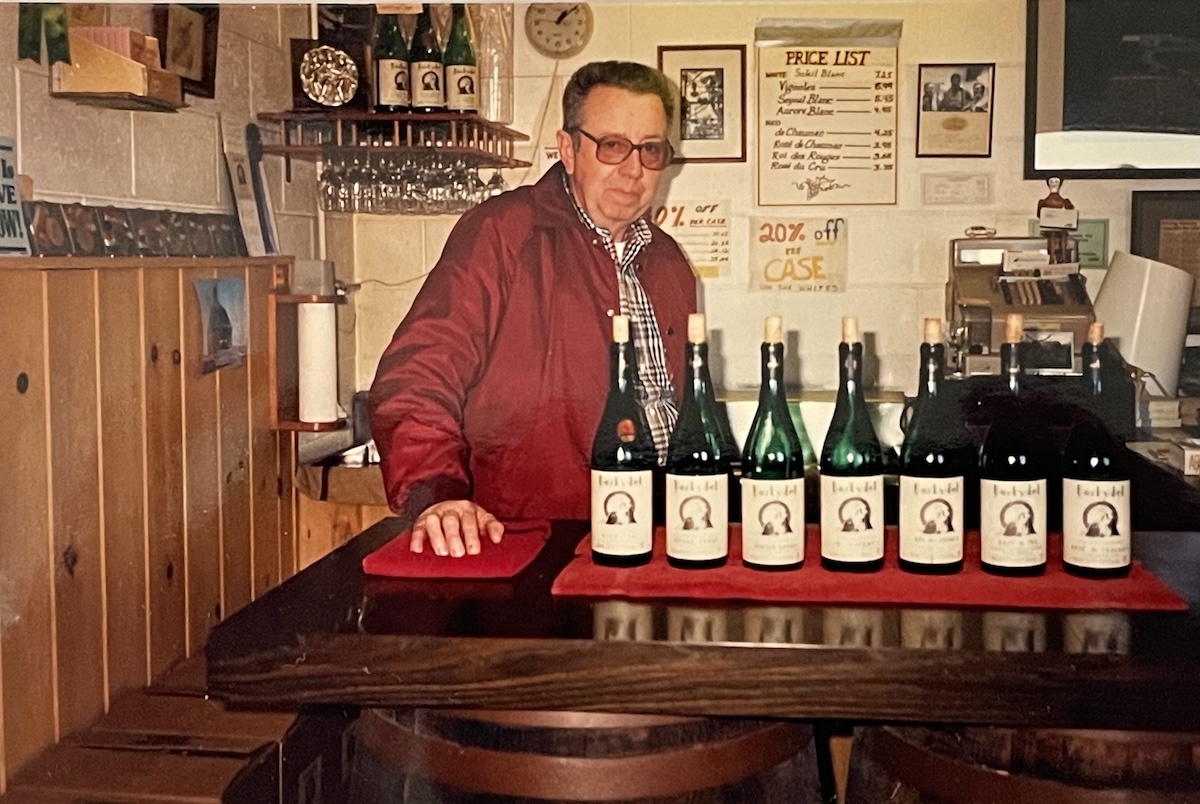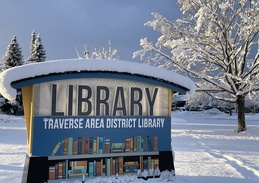
Remembering Bernie Rink
Seven years after his death and nearly sixty since he first planted grapes on Leelanau Peninsula, Bernie Rink’s legacy lives on
By Ross Boissoneau | Sept. 20, 2025
Pop quiz: Bernie Rink was A) The godfather of northern Michigan’s wine industry; B) an art visionary; C) a Renaissance man; D) an old curmudgeon.
Bernie would probably bristle at A, B, and C, but truth to tell, they’re all pretty accurate, including D. So that makes the answer E, all the above.
Doubtless Bernie’s greatest notoriety stems from the fact he was the first person in northern Michigan to establish a working vineyard. He planted his first wine grapes in the mid-1960s, despite the opinion of “experts” who didn’t think the climate would support such grapes.
The Godfather of NoMi Wine
Bernie proved otherwise, and in 1970 planted 15 acres. Six years later, he opened the tasting room at Boskydel Vineyard.
Others soon followed his example. One of the early pioneers of the region’s wine industry is Larry Mawby. When asked if there would even be a wine industry if it hadn’t been for Bernie Rink, he considers. “I don’t know. It wouldn’t have started when it did,” he says.
But it did, and it was because of Bernie. “Somebody had to start it. He was the first to say, ‘I’m going to make it a commercial enterprise.’ I can’t speak for Chateau Grand Traverse or Leelanau Cellars [other early wineries], but I don’t know that I would have done it without speaking with Bernie,” Mawby continues. “It was nice at [age] 23 to see Bernie had been growing grapes for a decade.”
Mawby says when he and other early adopters started their wineries, they often turned to Bernie for advice. They then went their own way and created their own spin on wine. “Nobody did what Bernie did. Everybody took their own path,” he says.
Andy Rink, the youngest of Bernie and wife Suzanne’s five sons (in order: Jim, David, Tom, Chris, and Andy), calls him the catalyst of the region’s wine business. And the boys were the built-in workforce. “We were cogs in our father’s machine,” he says.
Maybe one should add another descriptor to Bernie’s legacy: F) dasher of athletic dreams. His sons had created a baseball diamond next to where the very first grapes had been planted, but it fell to the plowman’s blade when Bernie planted more grapes.
All the better to teach the boys the meaning and value of hard work. “He grew up on a farm in Cleveland, taking vegetables to market. He taught [us] to value and respect hard work, and leave the world better than you found it,” Andy says.
The Art Visionary
Before Bernie dedicated himself to the wine business, he was the librarian—the first librarian—at Northwestern Michigan College. He also founded the college’s Inuit art collection.
“Inuit art was his other passion,” says Craig Hadley, executive director and chief curator at the Dennos Museum Center at NMC. “We get visitors who come to the museum because they know of it.” He says even those who know about it are stunned at the quality and the number of objects of Inuit art. “Visitors are blown away at the scale of the building and the scale of the collection.”
Hadley says the bare walls of the early library begged for some décor that also served an educational purpose. “The walls needed something. Art could be part of the experience.” Enter: Bernie. “He had the opportunity to shape the library according to his vision for an educational community space,” Hadley adds.
Turns out Bernie was indeed a visionary (see B above). The brochure developed prior to the construction of the museum featured Inuit art on the cover and throughout, and Inuit art was the first item noted in the description of the facility.
How did two such diverse interests coalesce in the plain-spoken farm boy from Ohio? Bernie was a scholar at heart with an indefatigable curiosity. “He was one of the smartest human beings you’d ever meet,” says Andy.
The Renaissance Man
Winemaking was actually a second career for Bernie, one he didn’t begin until he was already in his 50s.
When Bernie retired from NMC, the library’s loss was the wine industry’s gain. He eventually embraced mechanical and technological advancements which enabled him and Andy to do most of the work in the vineyards themselves after his brothers had left the nest, with help from neighbors, classmates, cousins, and other friends.
Asked which Boskydel wines were most memorable, Andy chooses two. “Our Vignole was very popular. De Chaunac was a French hybrid, a great red wine grape that wasn’t so popular or highly sought. It was not a trendsetter, [but] was a great dark red.”
Making you thirsty for some Boskydel wine? There are still a few bottles floating around at retailers that carry tribute bottles or through online platforms like Vivino or Wine Searcher. In addition, Mawby, Bel Lago, and Good Harbor Vineyards made some wines from Boskydel’s grapes.
But nothing lasts forever. In 2017, Bernie and his sons made the difficult decision to close Boskydel down. No more tasting room, no more wine. Bernie was 91, and while oldest brother Jim and Andy were nearby to help out, they had their own lives. “Dad didn’t have the energy,” says Andy.
Though he and Jim were able to keep things going, they weren’t the essence of Boskydel—it was Bernie that customers came to see. “Dad became the person people wanted. Jim and I were no Bernie,” says Andy.
And despite the growing attraction of wineries, tours, and wine events in Leelanau County, Bernie had never looked to expand the winery into anything beyond the small tasting room. “Dad’s goals weren’t the same as other people. He was not interested in food or events,” Andy says.
The brothers knew that to remain viable, Boskydel would take not only a commitment of time but of finances. “We would have to invest a million or two or take on a partner. We didn’t want to go into a massive amount of debt,” says Andy.
When they approached their father with that reality, he balked at first, but soon grew to embrace the idea of shuttering the winery. “He was shocked, but a couple weeks after, Dad said it’s served its purpose,” says Andy.
The Old (and Beloved) Curmudgeon
That sentiment was echoed in a story in the Detroit News on Boskydel’s closure. Bernie was quoted as saying, “This winery has served its purpose. I wanted to figure out which grapes would grow well in this climate and to make good, affordable wines. And I wanted to keep my boys busy.”
For Bernie, the winery had been more of a science project that provided a means to teach his sons the value of work, as he had learned it on his family farm. “He insisted early on that [he] did the vineyard thing to keep his boys busy and out of trouble,” says Mawby.
Andy agrees. “Dad would have told you it was an exercise in child-rearing. He and Mom, after four boys [Andy was the fifth, coming along eight years after the next-oldest brother], wanted to keep us busy. He wanted to make us into good men, keep us out of trouble. Those are his words.”
It seems to have worked. “None of us are in jail,” Andy says with a laugh.
Andy is quick to credit his mother Suzanne for her part in bringing up five boys and keeping the family and winery going. “Mom was always there. She was an endearing and loving mom and wife, supportive in everything.
“Dad referred to her as the prop root of our family,” Andy continues, referring to the root of a plant that provides stability. “Dad was a curmudgeon, Mom was jovial with hugs, kisses.”
The Land Protector
While the winery is no more, the property will never be developed. The 55-acre family farm was protected by an agreement with the Leelanau Conservancy signed in 2020. The conservation easement restricts development, even as the land could be sold and continue under private ownership.
Kim Hayes, the Farm Protection Director at the Leelanau Conservancy, worked with Bernie and the Rink family.
“He and one of his sons worked closely with us and the Natural Resources Conservation Service on drafting the perpetual conservation easement protecting the agricultural and natural resource values of the property,” Hayes says. “Bernie passed away before the transaction closed, but he was instrumental in initiating the project protecting the land he loved so much.”
Conservation easements on agricultural land are typically flexible for ongoing agricultural uses, and related commercial uses, such as winemaking and wine tasting, are often permitted as well. But splitting the property or building other commercial or residential structures is not allowed. Such restrictions are permanent.
Hayes says the property has since been sold, and the owner has replanted the property with new vines, 60 years after the first planting, with plans to eventually make and sell wine from the grapes.
Photo of Bernie Rink at Boskydel. Courtesy of the Rink Family.
Trending

Winter Break at the Library
Trying to keep the kids busy while school is out? Head to the library! Dec. 22, take your 12+ tweens and teens to the Mesick… Read More >>
Umbo Is Coming...to The Little Fleet
Winter isn’t just coming—it’s already here. But if you want a break from the December blues, head to The L… Read More >>
GTB Starting the Year with Tradition
The Grand Traverse Band of Ottawa and Chippewa Indians hosts the Kchi Wiikwedong Anishinaabek Maawnjidowin Round Dance on Ja… Read More >>


